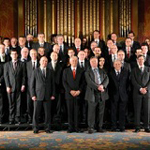 On 20 April the UK Justice Secretary Ken Clarke announced that the so-called Brighton Declaration on reforming the European Court of Human Rights had been agreed by all 47 signatories to the Declaration.
On 20 April the UK Justice Secretary Ken Clarke announced that the so-called Brighton Declaration on reforming the European Court of Human Rights had been agreed by all 47 signatories to the Declaration.
Speaking at the Council of Europe Conference in the city, Mr Clarke said: “These reforms represent a substantial package of reform and are a significant step towards realising the goals that the Prime Minister set out in Strasbourg.
“Taken together, these changes should mean fewer cases being considered by the court. Those that it considers should be allegations of serious violations or major points of interpretation of the Convention and will be processed without the scandalous delays we are seeing at present.
“The court will not normally intervene where national courts have clearly applied the Convention properly. These reforms strengthen the commitment of all the member states to the obligations of the Convention and will improve the ability of the Court to enforce these obligations sensibly.”
Attorney General Dominic Grieve added: "This Declaration makes clear that the primary responsibility for guaranteeing human rights rests with the government, parliament and courts of a country. It sets out clearly that the Court should not routinely overturn the decisions made by national authorities – and it should respect different solutions and different approaches between states as being legitimate.
“The Court is there to ensure the highest protection of fundamental rights. This agreement secures this vital position for the court and will allow it to do the job it was created to do and protect individuals across Europe from state oppression.”
Reform of the Court was one of the key priorities for the UK’s chairmanship of the Council of Europe and the foundations of today’s reforms were laid in a speech given to the Court by David Cameron in a speech earlier this year.
Despite the reform being agreed by all parties, there were reservations. The Court’s president, British lawyer Sir Nicholas Bratza, said in a speech to the conference: “The principal characteristic of a court in a system governed by the rule of law is its independence. In order to fulfil its role the European Court must not only be independent; it must also be seen to be independent. That is why we are, I have to say, uncomfortable with the idea that Governments can in some way dictate to the Court how its case-law should evolve or how it should carry out the judicial functions conferred on it.”
• Pictured are the delegates from the 47 member countries of the Council of Europe.